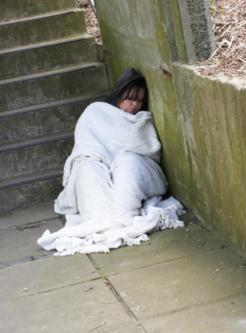After a week in which Montreal faced temperatures that felt like minus 40 degrees Celsius, one group is raising the alarm over some shelters’ refusal to take in trans women from the cold.
Action Santé Travesti(e)s et Transsexuel(le)s du Québec (ASTT(e)Q, or, in English, Quebec Trans Health Action, released a statement Jan 25 via its Facebook account, accusing unspecified homeless shelters of turning away trans people.
“Over the past week of bitter cold, ASTT(e)Q . . . has witnessed several of our members be denied shelter on the grounds of being trans,” reads the release.
ASTT(e)Q is a Montreal-based project of CACTUS, one of the city’s preeminent harm-reduction groups.
Nora Butler Burke, coordinator for the group, says the problems have been around for decades. She says certain groups are leading the way in making their spaces safe and accessible for trans people, while others have been flatly opposed to letting in trans women. The rest fall in the middle, with some taking only half-measures – such as giving trans people private rooms when available, but refusing them if it means sharing a room.
Butler Burke says it’s frustrating that many of these shelters have yet to draft policies or guidelines. “You would think you would get to a point where there’s this common understanding of what it means to be a woman,” she says.
On the other hand, L’Abri d’Espoir, a shelter operated by the Salvation Army, maintains a very clear policy – unless you have an “F” designation on official documents, you can’t come in.
Rebecca, the director general for the shelter (who declined to provide her last name), says that rules are rules and there’s little she can do. Unless a trans woman can provide a Quebec driver’s licence or health card that lists her as a female, she won’t be allowed to enter the women’s shelter.
Rebecca says it’s not an issue of discrimination – she says the shelter has taken in many trans women – it’s a matter of creating a safe space for the shelter’s other clients.
Butler Burke points to this as a substantive problem because the Quebec government has not yet moved forward on streamlining the process for trans people to change the designation on their government-issued documents. Ontario recently revised those procedures, opting to allow trans people to change their documents with only a signed document from a doctor or psychiatrist. While Quebec legislators have indicated a willingness to make similar changes, nothing has been done.
While L’Abri d’Espoir might not be accessible to those still transitioning, or unable to transition, staff at two other Montreal shelters say they work hard to be accessible to all trans people.
“We don’t discriminate on that basis,” says Matthew Pearce, director general at the Old Brewery Mission, the largest women’s shelter in the country. He says it’s “very common” to have trans people using the mission’s shelter. The shelter doesn’t require any ID to admit those seeking lodging.
Caroline Defour, director of youth services for Dans la Rue, says that their youth shelter – dubbed “the Bunker” – has moved to accommodate trans youth under 21.
“We have a separate room that allows us to admit transsexuals,” she says. While they don’t get a large number of trans people using the Bunker – only a couple since December – that space is still critical for giving trans youth a space to feel safe and comfortable.
Yet Defour points out that spaces like the Bunker aren’t common in Montreal.
“It’s unfortunate that they can’t find somewhere like this anywhere else. They need their own place,” she says.
Pearce echoes that thought, pointing out that there is no dedicated space for homeless trans people in Montreal. While the Old Brewery Mission has always tried to be open to trans people, he says, “our men’s and women’s are not adapted to that need.”
Pearce says he’s been calling for better access for trans people seeking shelter and notes that the mission would be interested in being the group to host such a space.


 Why you can trust Xtra
Why you can trust Xtra


